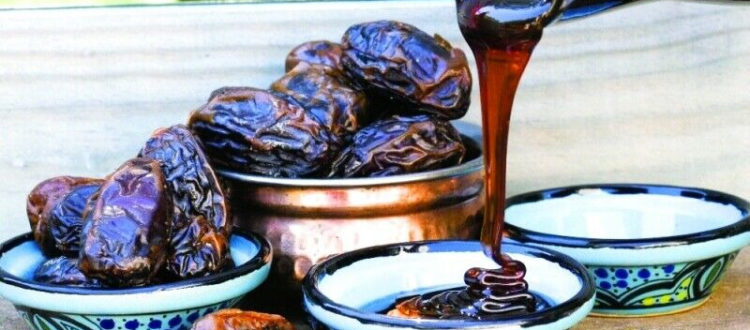A Land Flowing with Milk and Honey
A Land Flowing with Milk and Honey
I walked across an empty land
I knew the pathway like the back of my hand
I felt the earth beneath my feet
Sat by the river and it made me complete
-Keane
This week’s Torah portion opens with the event of sending spies to investigate the land of Israel before the Israelites were to enter and conquer it. Twelve spies, one from each tribe, had a straightforward mission: They were to check out the weak areas of the enemy, observe how fertile the land was and see if the cities were fortified and difficult to overcome
The Torah points out that they went at the beginning of the grape-ripening season and that the land was indeed quite fertile as they came back bearing large fruits testifying to its richness. The iconic image of men carrying huge clusters of grapes borne on long poles on the shoulders of the spies adorns the label of Carmel wines and the Ministry of Tourism in Israel today.
Israel has always been associated with the beauty and richness of its natural resources. The spies confirmed that indeed it was a “land flowing with milk and honey”. According to Jewish tradition, the honey spoken about is actually from dates and not bee honey.
As long as the Jewish people dwelt in Israel, it was a very fruitful place. However, God warned us through many prophets that, in the event of exile, it would lose all its glory and become completely desolate. The Talmud testifies to this in tractate Sotah 48a where the Mishna states that Rabbi Yehoshua, who lived during the destruction of the Temple, notes that “the dew does not descend in blessing and that flavour has been removed from fruits.” Through subsequent generations Israel became a wasteland and in the 1800’s, in Mark Twain’s travel log, he penned as much on his visit to Israel:
We traversed some miles of desolate country whose soil is rich enough but is given wholly to weeds – a silent, mournful expanse … desolation is here that not even imagination can grace with the pomp of life and action. We never saw a human being on the whole route. We pressed on toward Jerusalem. The further we went the hotter the sun got and the more rocky and bare, repulsive and dreary the landscape become. Jerusalem is mournful, dreary and lifeless.
But we always knew that this fate of desolation was not to be forever. Time and again we are told by those self-same prophets that Israel will return to her former glory when the Almighty brings us back from our exile. And indeed we live in a very special time where we have witnessed first-hand the rebuilding and the renewal of the natural beauty and glory of Israel. We are fortunate enough to live in an era where we can hop on a plane and, in a matter of hours, personally be part of the lovely and gorgeous land that millions of Jews for countless centuries could only dream of visiting or living in.
Many years ago I came across an article in The New York Times that appropriately appeared on the selfsame week of this week’s parsha which describes the prosperity and lushness of the land. It spoke of a small but miraculous and symbolic event of renewal of Eretz Yisrael.
Scientists in Israel have confirmed that an ancient date palm seed retrieved from the rubble of Masada and successfully germinated is about 2,000 years old. That makes it the oldest seed ever to sprout, beating the previous well-documented record holder, a lotus found in a dry lakebed in China, by about 700 years.
The date seed was among several obtained in the 1960s by archaeologists excavating Masada, the fortress in the Judean Desert built by Herod around 35 B.C. and destroyed by the Romans in A.D. 73. In 2005, three seeds were planted by Sarah Sallon of the Louis L. Borick Natural Medicine Research Center, part of the Hadassah Medical Organization in Jerusalem. One seed germinated, and three years later, Dr. Sallon and colleagues report in “Science” that the resulting plant is healthy and more than three feet tall. Radiocarbon testing of shell fragments of the seed obtained when the plant was repotted at 15 months show that it dates from the time of Masada.
(For an updated 2020 report on these dates, click here: https://www.youtube.com/watch?v=ZJhUzVc9C8M)
The Judean Dead Sea region around the first century A.D. was well known for its date palms that produced fruit of high quality, but over the centuries this line of plants was lost. Genetic analysis of the germinated seed has provided just limited information about this ancient line. The researchers say more seeds are needed for a more thorough understanding of what made those old dates so good.
What made these old dates so good? I’m not so sure how much more research we really need for we know the answer and have known it for thousands of years. God promised us a land flowing with milk and date honey. He also told us that it would be desolate when we were exiled but that it would regain its lush, beautiful and sweet fruit when we returned.
How symbolic that these dates of Masada, the place of one of the last stands against foreign Roman rulers who sought to destroy our connection to Eretz Yisrael, are now replanted and growing in Israel today. And just like Am Yisrael – the Jewish nation – they have been resurrected to grow and thrive so beautifully once again. Growing and flourishing and as sweet as honey from a date.
I came across a fallen tree
I felt the branches of it looking at me
Is this the place we used to love?
Is this the place that I’ve been dreaming of?

